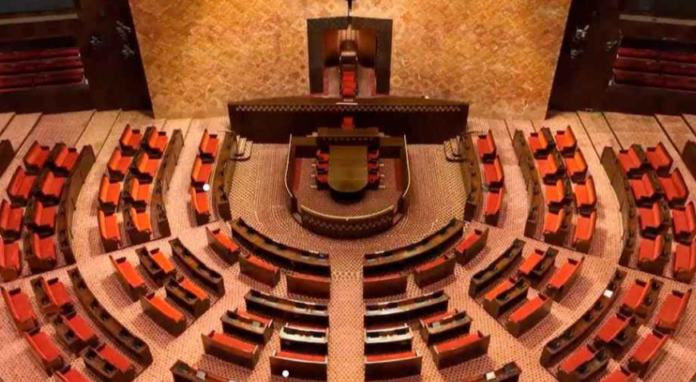Amit Pandey

Inner Conscience; A Vanishing Muse
Once, the corridors of power echoed with whispers of inner conscience Legislators, unshackled by party whips, followed their hearts. Today, pragmatism reigns supreme. Bribery, threats, and pressure orchestrate the ballet. Survival hinges on compliance. Why do parties embrace candidates who crumble under duress? Can a sapling thrive in the tempest of politics? Some MLAs rebel, dissatisfied with party picks. Others, ambitious stargazers, seek constellations beyond their party’s sky.
Uttar Pradesh’s Political Kaleidoscope
In the heartland of Uttar Pradesh, where the Ganges whispers secrets, political constellations shift: Manoj Pandey the chosen one, is poised to claim Raibareli’s Lok Sabha throne. Kunwar Rewati Raman Singh, his eyes on Allahabad’s coveted seat, treads a tightrope. The Congress-Samajwadi pact left him yearning. The BJP beckons and Rewati Raman answers. The dance continues, alliances reshuffled, ambitions recalibrated.
In the Mosaic of Politics: Amidst the tumult, the Rajya Sabha stands—a sentinel of federalism, a canvas for conscience. Its echoes ripple through time, whispering tales of courage, compromise, and conviction. As Rewati Raman crosses party lines, as voice votes echo, and as Money Bills tiptoe, we witness democracy’s intricate embroidery—a patchwork of ideals, stitched by the hands of destiny.
Some are trying to portray it as the magic of Modi, but in reality, it was a result of relentless ambition, discontent, and political opportunity with bargaining capacity. Those who have been involved in this system for a long time knew that when their inner voice demanded a change or chose them for a leadership role, the opportunity would present itself. It was not magic, but rather a cultural shift in the market of politics that compelled a harmonious call for change.
However, if this magic were truly effective, then why did it not work in Karnataka? The Congress party was able to successfully manoeuvre and secure power, showcasing their ability to achieve what they aimed for. The Chief Minister of Himachal Pradesh followed the path of the Congress culture, even though stalwarts refused to meet with him. Sukkhu, the Chief Minister, never made an effort to engage in dialogue with his legislators, which may have been due to overconfidence or negligence. Only he knows the true reason, but the outcome was evident to all. It is difficult to dress up someone’s failure as a victory for others.
This is not a new or isolated experience. I recall a Rajya Sabha election in Bihar where the RJD candidate was defeated due to cross-voting. Durga Prasad Singh, a Kuswaha leader from Samastipur, Ujiyarpur Assembly, refused to vote for a bureaucrat. When questioned by Lalu Prasad Yadav, he explained that his conscience did not allow him to vote because many members of our organization who have been loyal and dedicated were overlooked for an outsider candidate. Thus, he felt betrayed. Similarly, in 2012, Manju Singh, the BSP MLA from Ballia Sadar Assembly, did the same in the RS elections in Odisha, leading to the victory of the BJP candidate. This is not an isolated incident, as such examples can be found in almost every Rajya Sabha election. The reason it is being discussed this time is due to the upcoming elections or some individuals attempting to perceive it as a victory for Modi’s management, although it is not a significant issue for discussion.
This situation raises many questions about the sustainability of leaders and whether leaders from outside the state are truly accepted. Leadership must also consider the well-being of their fellow legislators and the loyal cadre who have participated in every battle. Finally, it highlights that no one can truly be faithful in this political system. Former Prime Minister Indira Gandhi faced a similar situation where many Congress leaders betrayed her and joined the socialist party, including individuals like Chandrasekhar, former Prime Minister, Jaypal Reddy, and many others. This showcases the lack of loyalty in Indian politics.
In every Rajya Sabha election, it is usual to observe the same but the biggest problem is going to arise for the saffron brigade because those who voted against their party whip will seek suitable positions in the BJP. As the party is the largest organisation in the country, it has already much hustle and bustle. How will it adjust the new candidates by gift because bargaining has already been done for this unlawful act? This is a question that many political observers and analysts are asking. The BJP, which has a clear majority in the Lok Sabha, is trying to increase its strength in the Rajya Sabha as well. It has been wooing and winning over members of other parties, especially from the Congress, through various means, such as offering them ministerial berths, party posts, or other benefits. This practice, known as horse-trading or defection, is considered unethical and undemocratic by many. It also violates the anti-defection law, which was enacted to prevent such opportunistic behaviour by elected representatives.
However, the BJP has been able to circumvent the law by exploiting the loopholes or by ensuring that the defectors resign from their original parties before joining the BJP. The BJP claims that it is not indulging in any wrongdoing, but rather, it is welcoming those who are disillusioned with their parties and want to join the BJP’s development agenda. The BJP also argues that it has the right to expand its base and influence in the Rajya Sabha, which is essential for passing important bills and reforms. The BJP’s strategy of poaching members from other parties has been successful in some states, such as Gujarat, Madhya Pradesh, Karnataka, and Manipur, where it has gained more seats in the Rajya Sabha or formed or retained the government. However, it has also faced resistance and criticism from some states, such as Rajasthan, where the Congress has managed to thwart the BJP’s attempts to topple the government. The BJP’s aggressive and ambitious approach to the Rajya Sabha elections has raised several issues and challenges for the Indian polity.
It has exposed the weakness and vulnerability of the opposition parties, which are struggling to maintain their unity and relevance. It has also raised questions about the sanctity and stability of the parliamentary system, which is based on the principle of representation and accountability. It has also created a dilemma for the voters, who may feel betrayed or confused by the changing loyalties and ideologies of their elected representatives. The Rajya Sabha elections, therefore, are not just a matter of numbers and seats, but also of values and principles. They reflect the state of the Indian democracy and the aspirations of the Indian people.
It is time to think about voters that they will vote for whom and why. When a candidate is selected by a party and defy on the inner call why are voters not listening the same because they are the legal owners of the country in this republican democracy? Why they are voting on the name of caste, religion and many irrelevant agendas? They should also vote on their inner voice. **Voting based on one’s inner voice means voting for the candidate or party that best represents one’s interests, values, and aspirations. It means voting for the common good of the nation, not for narrow or selfish motives. It means voting with awareness, responsibility, and conscience. However, many voters in India are influenced by various factors that affect their voting behaviour, such as caste, religion, education, income, party affiliation, media, and identity. These factors may prevent them from voting on their inner voice and may lead them to vote for candidates or parties that do not serve their true interests or the interests of the country. Therefore, it is important to educate and empower the voters to make informed and rational choices in elections, and to encourage them to vote on their inner voice, not on external pressures or inducements.


